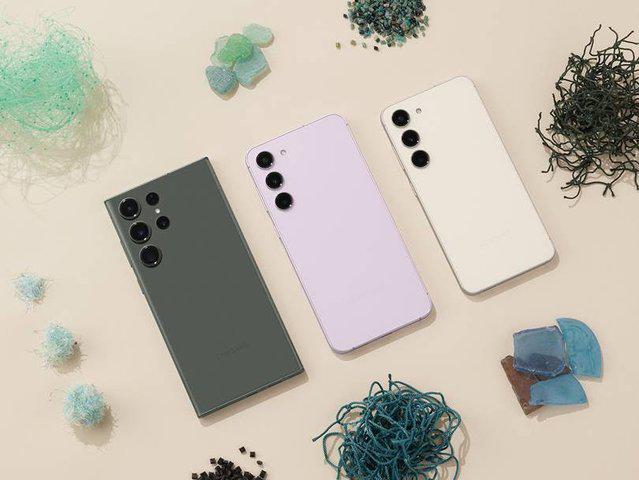Samsung Celebrates Earth Day 2024 with Innovations for a Greener Sustainable Future

As the world commemorates Earth Day on April 22, 2024, Samsung remains committed to continue using its expertise to develop innovative solutions that minimise environmental impact and contribute to a healthier and sustainable planet.
In an era where environmental preservation is paramount, Samsung continues to contribute towards a greener future, integrating eco-conscious practices into every facet of its operations and product offerings.
The company’s dedication to sustainability is not just a corporate ethos but a responsibility to future generations. Below are some of its notable innovations that contribute towards a healthier environment.
Eco-Packaging: With its various eco-friendly initiatives, Samsung is prioritising sustainable packaging practices. By utilising recyclable materials, reducing packaging waste, and implementing innovative design strategies, the company strives to minimise its environmental footprint throughout the product lifecycle, from production to disposal. A big part of this is upcycling of the boxes that come with the company’s lifestyle TV models such as The Frame and The Serif.
The special cardboard boxes are designed to allow consumers to upcycle the packaging their televisions come in into small, versatile pieces of furniture. The thick, corrugated cardboard that the packaging is comprised of can be used to construct small tables and shelves, and building instructions can be accessed by scanning QR codes on the outside of the boxes.
E-Waste Recycling Initiatives: Samsung is committed to responsible e-waste management through our comprehensive recycling programs. The company ensures that end-of-life electronic products are ethically recycled, diverting electronic waste from landfills and recovering valuable resources for reuse in new products, contributing to a circular economy and minimising environmental degradation. Through one of its corporate social investment programmes, the Equity Equivalent Investment Programme (EEIP), Samsung has supported and invested in Matongoni Group, a local company which specialises in the recycling of electronic waste and materials from shopping centres, industrial and agricultural activities and landfill sites.
Eco-Friendly Materials: The pursuit of sustainable manufacturing practices has seen Samsung using eco-friendly materials in product design and production processes. The environmental footprint is reduced through the incorporation of recycled plastics, bio-based materials, and other sustainable alternatives into products, promoting resource conservation and waste reduction.
SolarCell Remote: Samsung developed the SolarCell Remote to combat the environmental impact of discarding used batteries. It is a rechargeable remote control, with a solar panel (solar cell) that can be charged by sunlight or indoor lighting. The remote can also be charged with a USB-C cable so consumers have many ways to charge their remote.
Environmental Partnerships: Samsung collaborates with environmental organisations such as the United Nations Development Programme (UNDP), as well as government and communities to address global environmental challenges and promote sustainability initiatives. Through strategic partnerships and collective action, the company works towards a shared vision of a greener, more sustainable future for all.
SmartThings for a Healthier Environment: Samsung’s SmartThings platform is revolutionising the way we interact with our surroundings, enabling users to create connected ecosystems that enhance efficiency and conserve resources. Through intelligent sensors, automated controls, and seamless integration with smart devices, SmartThings optimises energy usage, reduces waste, and promotes sustainable living.
Moreover, in harnessing the power of artificial intelligence, Samsung’s AI Energy Management solutions optimise energy consumption across various product offerings.
AI Energy Mode generates real-time hourly, daily, weekly and monthly histories of your energy consumption, compared to the amount spent in that period and by device, reducing costs and making life easier at all times with its many functions.
Machine learning brings a wide range of benefits to areas of the home and your everyday life, by understanding your routine and adapting to save energy intelligently. From times of usage and weighing loads of clothes in your washing machine to defining the defrost cycles of your refrigerator, AI Energy Mode intelligently learns usage patterns and controls all kinds of variables, all leading to optimised energy usage.
“These concerted efforts reinforce our commitment to an environmentally friendly business approach and set the tone for responsible innovation in the consumer electronics industry. As we commemorate Earth Day 2024, we are reminded that it is not the responsibility of one person or company but all of us to make the necessary moves and changes that will drive positive environmental change. Through sustainable innovation and by integrating eco-conscious features in our products, promoting responsible manufacturing practices, and fostering a culture of sustainability, we believe we are helping pave the way for a better future for our planet and future generations,” said Mike van Lier, Vice President for Consumer Electronics at Samsung Electronics South Africa.
Supplied by: Samsung.
Guzzle Media










































































































































